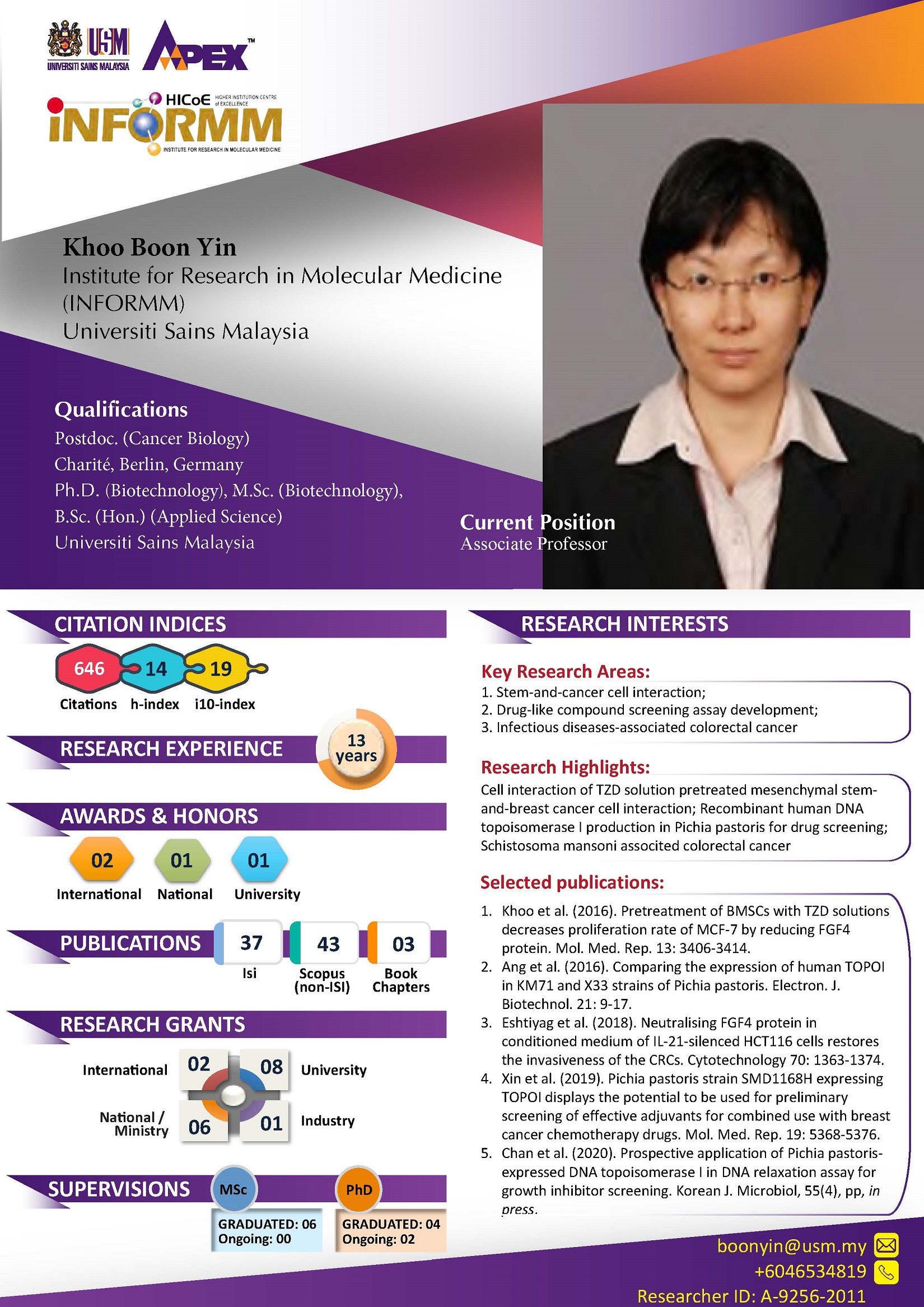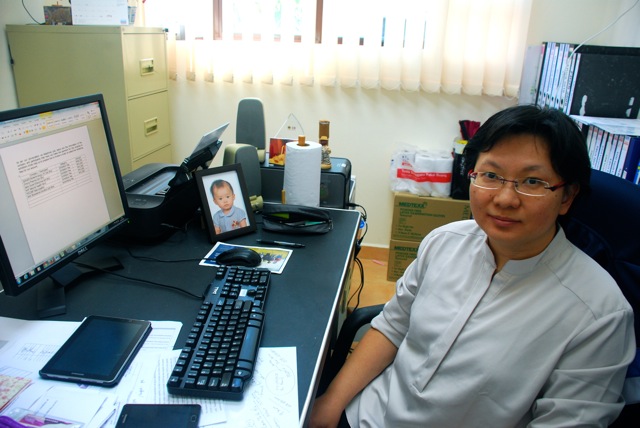Khoo Boon Yin


Name
Khoo Boon Yin
Current Position
Associate Professor
boonyin@usm.my
Office Telephone
+604-6534819
Qualifications
B.Sc.(Hon.), Universiti Sains Malaysia, 1999.
M.Sc., Universiti Sains Malaysia, 2003.
Ph.D., Universiti Sains Malaysia, 2007.
Affiliations
Associate member of the American Association for Cancer Research (AACR, 234250)
Member of Malaysian Society for Biochemistry & Molecular Biology (MSBMB)
Research Interests
Stem-and-cancer cell interaction, breast cancer, recombinant human DNA topoisomerase, Pichia pastoris, drug screening assay, infectious colorectal cancer
Research Overview 1
Interaction of drug solution pretreated BMSCs with breast cancer cells
This research aims to investigate the effects of bone marrow-derived mesenchymal stem cells (BMSCs) that have been pretreated with drug solutions on human breast cancer cells. BMSCs pretreated with the drug solutions reduce the growth and proliferation rate of MCF-7, an effect that may be attributed to the reduction of FGF4 protein level in the pretreated BMSCs conditioned medium. The drug solutions pretreated BMSCs may have a potential application in stem cell?mediated therapy for human breast cancer and other malignancies.
Research Overview 2
Expression of multiple copy recombinant DNA topoisomerase gene in Pichia pastoris
This research describes the selection of clones containing multiple copy number gene for expression of human DNA topoisomerase in shaker flask system. DNA relaxation activity reveals that the target enzyme in the culture supernatants of GS115 exhibits consistent enzyme activity over the cultivation time-points. The enzyme produced can be used for affordable gel-based DNA relaxation assay development in performing high throughput screening for target-specific growth inhibitors. These inhibitors may contribute to the improvement of the treatment of cancer patients.
Research Overview 3
Fundamental study of infectious colorectal cancer
This research demonstrates that silencing IL-21 gene in HCT116 increase the cytotoxic level and FGF4 mRNA expression in the cancer cells. Gene silencing also reduces the aggressiveness of the cancer cells. Neutralizing FGF4 in conditioned medium of IL-21-silenced HCT116 further increase the cytotoxic level but restore the aggressiveness of HCT116. The results pave the knowledge for the discovery of important factors to be used as biomarkers for new drug design to effectively treat the patients having infectious diseases and colorectal cancer simultaneously.
Selected Publications
- Khoo BY, Nadarajan K, Shim SY, Miswan N, Zang CB, Possinger K, Elstner E. Pretreatment of BMSCs with TZD solution decreases the proliferation rate of MCF?7 cells by reducing FGF4 protein expression. Mol Med Rep. 2016 Apr; 13(4): 3406-14. doi: 10.3892/mmr.2016.4959. PMID: 26934829
- Nadarajan K, Balaram P, Khoo BY. MK886 inhibits the pioglitazone-induced anti-invasion of MDA-MB-231 cells is associated with PPAR?/?, FGF4 and 5LOX. Cytotechnology. 2016 Oct; 68(5): 1771-87. doi: 10.1007/s10616-015-9930-5. PMID: 26754842
- Yogarajah T, Bee YT, Noordin R, Yin KB. Increased peroxisome proliferator-activated receptor ? expression levels in visceral adipose tissue, and serum CCL2 and interleukin-6 levels during visceral adipose tissue accumulation. Mol Med Rep. 2015 Jan; 11(1): 515-20. doi: 10.3892/mmr.2014.2686. PMID: 25324014
- Khoo BY, Miswan N, Balaram P, Nadarajan K, Elstner E. Modification of MCF-10A cells with pioglitazone and serum-rich growth medium increases soluble factors in the conditioned medium, likely reducing BT-474 cell growth. Int J Mol Sci. 2012; 13(5): 5607-27. doi: 10.3390/ijms13055607. PMID: 22754319
- Khoo BY, Chua SL, Balaram P. Apoptotic effects of chrysin in human cancer cell lines. Int J Mol Sci. 2010 May 19; 11(5): 2188-99. doi: 10.3390/ijms11052188. Review. PMID: 20559509
- Hong TB, Rahumatullah A, Yogarajah T, Ahmad M, Yin KB. Potential effects of chrysin on MDA-MB-231 cells. Int J Mol Sci. 2010 Mar 11; 11(3): 1057-69. doi: 10.3390/ijms11031057. PMID: 20479999
- Boon Yin K, Najimudin N, Muhammad TS. The PPARgamma coding region and its role in visceral obesity. Biochem Biophys Res Commun. 2008 Jun 27; 371(2): 177-9. doi: 10.1016/j.bbrc.2008.04.013. Review. PMID: 18413145
Author Links
